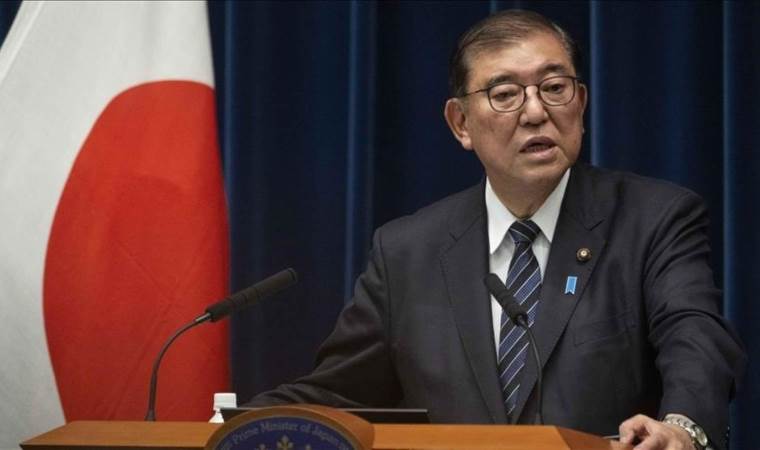'Turkiye on verge of strong disinflation,' says finance minister Şimşek
Şimşek projected that inflation would decrease to low 40% or high 30% levels by year's end, to 10% levels in 2025, and single digits in 2026

Turkish Treasury and Finance Minister Mehmet Şimşek said on Thursday that the country is on the verge of sustaining strong disinflation thanks to the economic program implemented by his ministry.
"Last year, this time, we faced significant macroeconomic challenges… some challenges persist," the minister said during his speech at the London Conference 2024 organized by Chatham House.
He highlighted the significant progress made in stabilizing the Turkish economy, noting that inflation, which peaked at 75% in May, is now on a rapid decline.
He elaborated on Türkiye’s status as a sizable economy, ranking 11th in purchasing power parity and 17th in current exchange rate basis, with 86 million people and a GDP of more than $1 trillion.
"Stability in such a big economy matters," he noted.
Reflecting on the aftermath of a devastating earthquake that severely impacted the fiscal balance, the minister acknowledged the necessity of immediate corrective measures.
"We did front-loaded fiscal adjustment last year in the form of tax hikes and spending controls," he explained.
The minister attributed past inflation spikes to unconventional monetary policies that had previously de-anchored inflation expectations.
Addressing these challenges, the minister outlined a revised monetary policy stance aimed at re-anchoring inflation expectations.
"Inflation peaked in May and looks set to decline rapidly," he asserted.
Şimşek projected that inflation would decrease to the low 40% or high 30% levels by the end of the year, to 10% levels in 2025, and single digits in 2026.
He also highlighted the reduction in Türkiye's country risk premium (CDS), which fell from 700 basis points to approximately 250 basis points within a year, indicating improved market confidence.
He also noted that access to foreign markets has significantly improved.
The minister stressed the importance of rebuilding foreign exchange (FX) reserves and implementing structural reforms to sustain economic gains.
"Our program is focused on achieving price stability, restoring fiscal health, narrowing the current account deficit, and achieving structural transformation, including green and digital transitions," he said.
"FX reserves of the Central Bank have increased by over $70 billion compared to last year," the minister reported.
The current account deficit has also seen substantial improvement, narrowing to an estimated 2-2.5% of GDP from 6% last year. The fiscal deficit has similarly seen positive adjustments.
"We’ve made progress across the board, but rebuilding monetary policy from scratch has taken time. Now we are on the verge of sustaining strong disinflation," the minister declared.
Acknowledging the impact of inflation on the populace, the minister noted the severe 75% inflation rate recorded in May. "Inflation is the most regressive form of taxation and the root cause of inequalities," he said, highlighting its significant implications on political outcomes.
He recalled a decade ago when inflation was under control, and reflected on the progress that has been made since then.
Şimşek also noted that domestic depositors have started converting their deposits to lira, reflecting their confidence in the program.
Turkish Treasury and Finance Minister Mehmet Şimşek said on Thursday that the country is on the verge of sustaining strong disinflation thanks to the economic program implemented by his ministry.
"Last year, this time, we faced significant macroeconomic challenges… some challenges persist," the minister said during his speech at the London Conference 2024 organized by Chatham House.
He highlighted the significant progress made in stabilizing the Turkish economy, noting that inflation, which peaked at 75% in May, is now on a rapid decline.
He elaborated on Türkiye’s status as a sizable economy, ranking 11th in purchasing power parity and 17th in current exchange rate basis, with 86 million people and a GDP of more than $1 trillion.
"Stability in such a big economy matters," he noted.
Reflecting on the aftermath of a devastating earthquake that severely impacted the fiscal balance, the minister acknowledged the necessity of immediate corrective measures.
"We did front-loaded fiscal adjustment last year in the form of tax hikes and spending controls," he explained.
The minister attributed past inflation spikes to unconventional monetary policies that had previously de-anchored inflation expectations.
Addressing these challenges, the minister outlined a revised monetary policy stance aimed at re-anchoring inflation expectations.
"Inflation peaked in May and looks set to decline rapidly," he asserted.
Şimşek projected that inflation would decrease to the low 40% or high 30% levels by the end of the year, to 10% levels in 2025, and single digits in 2026.
He also highlighted the reduction in Türkiye's country risk premium (CDS), which fell from 700 basis points to approximately 250 basis points within a year, indicating improved market confidence.
He also noted that access to foreign markets has significantly improved.
The minister stressed the importance of rebuilding foreign exchange (FX) reserves and implementing structural reforms to sustain economic gains.
"Our program is focused on achieving price stability, restoring fiscal health, narrowing the current account deficit, and achieving structural transformation, including green and digital transitions," he said.
"FX reserves of the Central Bank have increased by over $70 billion compared to last year," the minister reported.
The current account deficit has also seen substantial improvement, narrowing to an estimated 2-2.5% of GDP from 6% last year. The fiscal deficit has similarly seen positive adjustments.
"We’ve made progress across the board, but rebuilding monetary policy from scratch has taken time. Now we are on the verge of sustaining strong disinflation," the minister declared.
Acknowledging the impact of inflation on the populace, the minister noted the severe 75% inflation rate recorded in May. "Inflation is the most regressive form of taxation and the root cause of inequalities," he said, highlighting its significant implications on political outcomes.
He recalled a decade ago when inflation was under control, and reflected on the progress that has been made since then.
Şimşek also noted that domestic depositors have started converting their deposits to lira, reflecting their confidence in the program.
Most Read News
-
 Pope Francis dies at 88 after prolonged illness: Vatican
Pope Francis dies at 88 after prolonged illness: Vatican
-
 Kremlin ‘satisfied’ with US position ruling out NATO mem
Kremlin ‘satisfied’ with US position ruling out NATO mem
-
 Russia, Ukraine report airstrikes as Putin’s Easter ceas
Russia, Ukraine report airstrikes as Putin’s Easter ceas
-
 Trump ‘values’ talks with Japan, says Premier Ishiba ami
Trump ‘values’ talks with Japan, says Premier Ishiba ami
-
 US scales back development, diplomatic presence in Afric
US scales back development, diplomatic presence in Afric
-
 Israel bans Palestinian minister from occupied West Bank
Israel bans Palestinian minister from occupied West Bank
-
 At least 33 civilians killed in RSF shelling of Sudan’s
At least 33 civilians killed in RSF shelling of Sudan’s
-
 Gold price exceeds $3,400 to reach new record high amid
Gold price exceeds $3,400 to reach new record high amid
-
 China sanctions US lawmakers, officials, NGO heads
China sanctions US lawmakers, officials, NGO heads
-
 El Salvador’s president calls on Maduro to release Venez
El Salvador’s president calls on Maduro to release Venez










